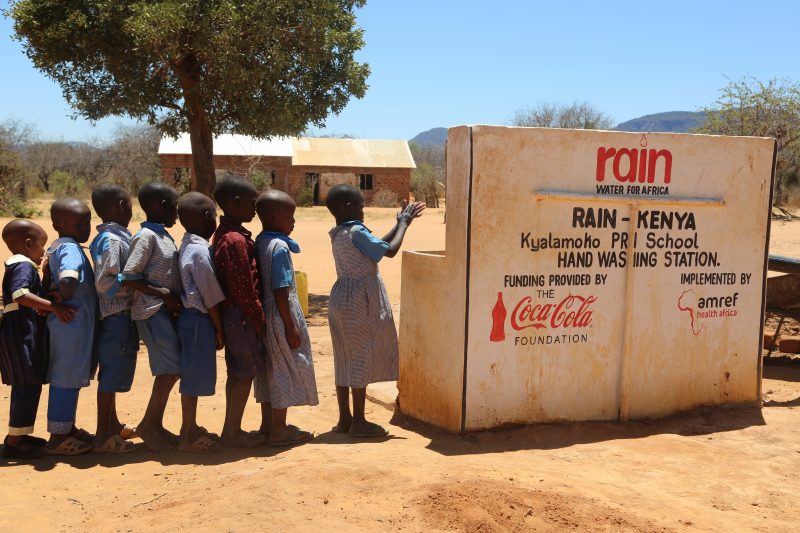Today we join the rest of the world in marking Global Hand Washing Day. This year’s theme: “Clean Hands – A Recipe for Health” with a focus on the link between hand washing and food – food hygiene and nutrition. As an annual event, the day is meant to mobilise and motivate people around the world to recognize the benefits of and improve their hand washing habits by using soap and running water. Numerous associated research studies have shown that many young children in developing countries do not wash their hands with clean water and soap.
Globally, every 23 seconds, a child dies from preventable causes such as pneumonia and/or diarrhoea. The simple act of hand washing with soap is the single most effective way to stop childhood deaths. It can reduce the spread of pneumonia by 23% and diarrhoea by up to 45%.
In Kenya, the need for hand washing education and practice in schools is most relevant because of the high likelihood of faecal contamination of the school environment. Many schools, especially in rural settings, have few latrines, inadequate water supplies, poor quality of available water sources, water storage in containers that permit hands to touch and contaminate stored water and lack of hand-washing facilities.
Besides impacting on school attendance, the resulting burden of diarrhoeal diseases and parasitic infestations has a negative impact on students’ growth, nutritional status, physical activities, cognition, concentration and school performance. Well-practiced and consistent hand-washing skills can also result to significant benefits in reducing incidences of gastro-intestinal and respiratory infections
Hand washing with soap and water is more crucial for children under five and those of primary school going age. It is therefore very important that health education about hand hygiene is introduced very early to influence healthy behaviours since lifestyle and behavioural choices are made in childhood.
In a recent WHO report it is evident that hand hygiene interventions significantly reduce infectious illness yet they are evidently lacking in educational settings that host children of the above critical ages and their teachers and caregivers. Promotion of universal hand washing with water and soap among children is possible because their poor hygiene habits are less established. They are within the age where lifelong behaviour is established as a cornerstone for the future.
Hand washing is most effective when it is done with clean water and soap. Governments around the world have put efforts to achieve UN Sustainable Development Goal No. 6; ensure access to water and sanitation for all, which is critical for successful realization of effective hand washing with soap. We can achieve this goal if we can demonstrate that a high proportion of our population is using safely managed sanitation services, including hand washing facilities fitted with soap and water as stated in indicator 6.2.1.
One of the low cost interventions targeted by the government (Ministry of Health) in ensuring Universal Health Coverage is the scaling up of maternal and child health by ensuring exclusive breastfeeding and hand-washing to prevent transfer of diarrhoea related disease through food during weaning period. Therefore emphasizing the importance of personal hygiene as a part of health care will go a long way in achieving “Health for All” by 2022.
Research shows that if people wash their hands with soap before handling food or after using the toilet, the incidence of diarrhoea and pulmonary infections would be reduced by 45% and almost 25 per cent respectively. Diarrhoea is the second most common cause of death among school-age children in sub-Saharan Africa. Well-practiced and consistent hand-washing skills can also reduce incidence of gastro-intestinal and respiratory infections.
 This year’s national hand washing celebrations has been commemorated in Kitui County to celebrate the milestones in hygiene realised as a result of intense advocacy by the government and partners such as Amref Health Africa. Advocacy and hand washing campaigns in schools have reduced child mortality in this region, a clear indication that if taught from an early age, hand washing could have far reaching positive impact among children.
This year’s national hand washing celebrations has been commemorated in Kitui County to celebrate the milestones in hygiene realised as a result of intense advocacy by the government and partners such as Amref Health Africa. Advocacy and hand washing campaigns in schools have reduced child mortality in this region, a clear indication that if taught from an early age, hand washing could have far reaching positive impact among children.
In developing countries, diarrhoea kills 2,195 children; more than malaria, AIDS and measles and 88% of these are linked to poor sanitation, improper hygiene and unsafe water (WHO, 2017). Children in Sub-Saharan Africa are 14 times likely to die from diseases like diarrhoea which are caused by unsafe drinking water and poor sanitation (Sengupta, Verma, & Kazmi, 2018). In Kenya alone, 90 new-born babies die every day within their first months of life (34,000 neonates every year, WHO 2017)
To ensure that Universal Health Coverage is possible in Kenya by 2022, greater focus has to be placed on primary health care, and particularly on prevention. Low-cost high-impact interventions such as hand washing have proven to significantly reduce the number of children dying in Sub-Sahara Africa and should therefore be scaled up.
